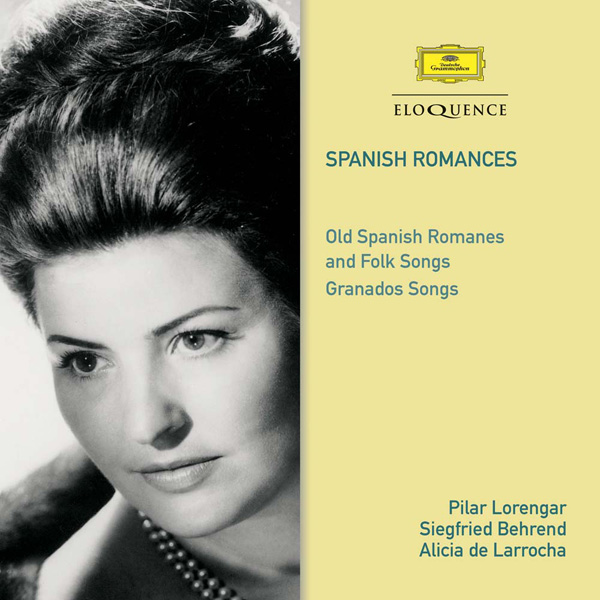When Pilar Lorengar died, a little over 20 years ago, at the age of 68 in her adopted city of Berlin, the tributes were unanimous for ‘one of the most beautiful voices heard in the post-war era’ (The Independent). She had grown up in Zaragoza and always treasured her introduction to the musical stage, practically as an infant, in a zarzuela troupe. Thus she learnt how to hold a stage, deliver a line and captivate an audience almost with her mother’s milk.
Those lyric-dramatic qualities distinguish the two albums compiled here. Issued originally on a DG Archiv LP, new to CD and freshly remastered are the Spanish ballads on CD1, arranged by the guitarist Siegfried Behrend for himself and Lorengar. These are vivid musical postcards, variously pastoral, sacred or vernacular in tone with melodies which have become well-known in other contexts such as Falla’s ‘Siete canciones populares españolas’ and his Harpsichord Concerto. Complementing the folksongs is a genuine Handelian rarity: ‘No se emenderá jamás’, an early cantata with an original Spanish text where Lorengar and Behrend are joined by the gambist, Richard Klemm.
‘A charming voice and exemplary diction,’ Gramophone’s original reviewer could not help noticing of Lorengar in March 1967. Years later, on the 25th anniversary of Lorengar’s debut at the Deutsche Oper Berlin, its Intendant, Götz Friedrich, commented: ‘She has made our ears clear and opened our hearts … the purity of her tone is grounded in harmony of person, voice, character and personality.’
A decade on from the album of folksongs, Lorengar had become a Decca artist, making delightful contributions to complete opera sets such as Mozart’s ‘Così fan tutte’ and ‘Die Zauberflöte’ (conducted by Solti). With the label’s ‘house’ Spanish pianist, Alicia de Larrocha, she recorded an album of ‘tonadillas’ by Granados in which native wit and warmth shines from every bar, responsive to every quick turn of emotion. Reflecting in 2003 on her career as a whole, Max Loppert in Opera noted this distinctive quality: ‘I cannot think of another soprano of the period who could so freely soar and be plangently affecting at one and the same moment.’
CD 1*
LUIS MILÁN: Romanze ‘Durandarte’
ANONYMOUS: Tres morillas m’enamoran
MILARTE: A la sombra de mis cabellos
DAZA: Enfermo estaba Antioco
PISADOR: Guarte el Rey Don Sancho
BERMUDA: Mira Nero
VASQUEZ: De los álamos vengo
ALONSO MUDARRA: Isabel, perdiste la tu faxa
NARVÁEZ: Con qué la lavare
GEORGE FRIDERIC HANDEL: No se emenderá jamás
Nine Spanish Folk Songs:
Zorongo
Las tres hojas
El café de chinitas
Anda, jaleo
Los cuatro muleros
Los reyes de la baraja
Romance de Don Boiso
Los pelegrinitos
La tarara
CD 2
ENRIQUE GRANADOS
Tonadillas en estilo antiguo:
La maja de Goya
Amor y odio
El tra-la-la y el punteado
El majo olvidado
El majo tímido
Callejeo
El mirar de la maja
Las currutacas modestas
El majo discreto
La maja dolorosa 1
La maja dolorosa 2
La maja dolorosa 3
Colección de canciónes amatorias:
Mira que soy niña
Iban al pinar
Mañanica era
No lloreís, ojuelos
Llorad, corazón
Gracia mía
Pilar Lorengar, soprano
Siegfried Behrend, guitar (CD 1)
Alicia de Larrocha, piano (CD 2)
*CD1: FIRST RELEASE ON CD
Recording Producers: Rainer Brock (CD1); James Walker (CD2)
Recording Engineers: Klaus Scheibe (CD1); John Dunkerley (CD2)
Recording Locations: Ufa-Studio, Berlin, Germany, 13 & 14 January 1966 (CD1); Rosslyn Hill Chapel, London, UK, 7–10 July 1977 (CD2) Originally released on Deutsche Grammophon 139 155 (CD1); Decca SXL 6866 (CD2)
Remastering Engineers: Michael Beier (CD1); Chris Bernauer (CD2)
‘[Lorengar] is at her best in some of the ‘Canciones amatorias’; in the delightful ‘Iban al pinar’ or in ‘No Iloréis ojúelos’, with its generous flowering of melody… [de Larrocha] has an utterly natural rightness of touch in this music… A record that offers playing of this quality can hardly be ignored.’ Gramophone, July 1978 (Granados)

